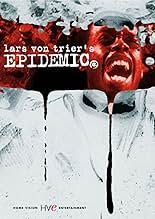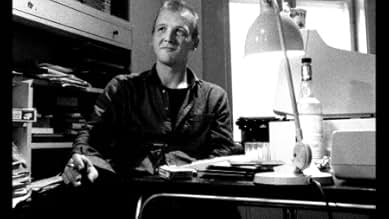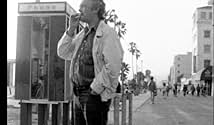Epidemic
NOTE IMDb
5,9/10
6,5 k
MA NOTE
Un réalisateur et scénariste écrit un scénario et, ce faisant, brouille la frontière entre fiction et réalité.Un réalisateur et scénariste écrit un scénario et, ce faisant, brouille la frontière entre fiction et réalité.Un réalisateur et scénariste écrit un scénario et, ce faisant, brouille la frontière entre fiction et réalité.
- Réalisation
- Scénario
- Casting principal
- Récompenses
- 1 nomination au total
Avis à la une
I like Von Trier's films and this one and "The Idiots" seem to me the ones in which he achieves through both the way they are shot and the plot in itself, a high quality of personal artistic expression.
Concentrating on "Epidemic", I think the contrast between the black and white parts and the "story" is intriguing and effective, visually disturbing and helping to create the symbolic meaning the viewer could take from this movie.
To me, beyond more evident interpretations about predestination, Dreyer-like bad and evil explanations, I believe Von Trier -with the help of, for instance, bleak houses, rundown sourroundings and disease- tries to tell us that the world we're living is infected by a growing disease, living its marks in EACH ONE OF US, making Europe in general a dull and heartless place to live, a world killing us very slowly and with it our soul, our sensibility and our ability to feel. Like the final song : "we all fall down".
Against the complacency and cynism of much of the cultural expression nowadays, I think Von Trier's work is an exemple. That is why I recommend "Epidemic" to IMDB users.
Concentrating on "Epidemic", I think the contrast between the black and white parts and the "story" is intriguing and effective, visually disturbing and helping to create the symbolic meaning the viewer could take from this movie.
To me, beyond more evident interpretations about predestination, Dreyer-like bad and evil explanations, I believe Von Trier -with the help of, for instance, bleak houses, rundown sourroundings and disease- tries to tell us that the world we're living is infected by a growing disease, living its marks in EACH ONE OF US, making Europe in general a dull and heartless place to live, a world killing us very slowly and with it our soul, our sensibility and our ability to feel. Like the final song : "we all fall down".
Against the complacency and cynism of much of the cultural expression nowadays, I think Von Trier's work is an exemple. That is why I recommend "Epidemic" to IMDB users.
"Epidemic" is, at its heart of hearts, a movie about making movies. As such it challenges the relation between fiction and reality. The two are not statically established realms, self contained in their clearly contained functional domains but they are dynamically interacting at all levels and at all times. The result is a movie in which the narrative structure is dual and of a meandering nature, climaxing in what could be a merge between a programmed project that involves human intellectual intervention- the movie within the movie- and the outbreak of a natural phenomenon with its catastrophic consequences- the epidemic.
Styllistically, "Epidemic" is very much a Lars Trier movie and it shows. From the apparently disconnected flow of scenes to mix of gritty realism with allegory, the director imprints his very personal mark in all elements of "Epidemic". Its very structure attests to this and the imagery reflects it in a very overt manner. "Epidemic" seems to be a playing ground of sorts in which Lars von Trier experiments as much as possible and in trying different things creates a diverse mismatch of scenes that not always work completely well together although they create an atmosphere.
As the process of coalescence between "fiction" and "reality" (this reality being, of course, fictional in itself which adds another layer of complexity and challenges the very notion of the third and fourth walls) heightens the narrative frame shrinks from the stage that is Europe to a small room. The claustrophobia of the later phase of the movie bring the full impact of the plague to the viewer's attention via a limited sample of the population that permits a personal experience of it all.
Much like Bergman's "The Seventh Seal", the plague in question is to be read on many levels and very much like the Swedish director's movie, "Epidemic" is not for everyone. Those who find it interesting, however, may have a strangely riveting experience upon watching this clearly unconventional movie that pushes many borders even if does not do so in a completely coherent manner.
Styllistically, "Epidemic" is very much a Lars Trier movie and it shows. From the apparently disconnected flow of scenes to mix of gritty realism with allegory, the director imprints his very personal mark in all elements of "Epidemic". Its very structure attests to this and the imagery reflects it in a very overt manner. "Epidemic" seems to be a playing ground of sorts in which Lars von Trier experiments as much as possible and in trying different things creates a diverse mismatch of scenes that not always work completely well together although they create an atmosphere.
As the process of coalescence between "fiction" and "reality" (this reality being, of course, fictional in itself which adds another layer of complexity and challenges the very notion of the third and fourth walls) heightens the narrative frame shrinks from the stage that is Europe to a small room. The claustrophobia of the later phase of the movie bring the full impact of the plague to the viewer's attention via a limited sample of the population that permits a personal experience of it all.
Much like Bergman's "The Seventh Seal", the plague in question is to be read on many levels and very much like the Swedish director's movie, "Epidemic" is not for everyone. Those who find it interesting, however, may have a strangely riveting experience upon watching this clearly unconventional movie that pushes many borders even if does not do so in a completely coherent manner.
Epidemic appears to be all stylistic self-indulgence. It is filmed in black and white, with often purposely redundant subtitles. Each shot is very very long. Some are stoic, some are suddenly goofy, some are disturbing, mostly stoic. When there is dialogue, it is intellectually stimulating, but borderline irrelevant.
Mainly, it is that director Lars Von Trier and his screenplay collaborator Niels Vorsel play themselves, coming up with a last-minute script for a producer. This strand takes disproportionate turns with scenes from their script, in which Von Trier plays a radical doctor attempting to cure a modern-day epidemic. In an warped turn, the doctor finds that he himself has been spreading it. For so long, one is left without a clue as to why there is such a coincidence between the screenplay and the outside world, or any progressions of the different narrative strands' signifying signs. But it infects you. It burns you.
Whether or not the film is narcissistic, it is not form over function. Essentially, it is a basic exercise in what metaphysically affects the viewer. Consider the scene of the darker, quieter of the screenwriters in the subway, knowing predeterminately that the other one is going to die. Or when he looks in a mirror, turns to us, the camera, then the mirror again. Everything one expects would create a cohesive, sense-making narrative film is inverted and indeed develops an immediately conscious connection between itself and the audience.
That is not to say it eschews any fundamental aspect of quality. Udo Kier delivers one of the most amazing, fantastic performances I have ever seen. Really, many of the performances, whoever these actors, or characters, are, shock and deeply move us. Some scenes are entirely made up of uproarious laughter or breakdowns of screaming, in spite of the unapologetic stoicism and quiet permeating the film.
This hypnotic abstraction is truly very atmospheric and creepy. It is a transcendental, almost physiologically affecting virus that infests you for days upon being subjected to it. It is something that has to be seen and can hardly be explained. And that makes it a true work of art.
Mainly, it is that director Lars Von Trier and his screenplay collaborator Niels Vorsel play themselves, coming up with a last-minute script for a producer. This strand takes disproportionate turns with scenes from their script, in which Von Trier plays a radical doctor attempting to cure a modern-day epidemic. In an warped turn, the doctor finds that he himself has been spreading it. For so long, one is left without a clue as to why there is such a coincidence between the screenplay and the outside world, or any progressions of the different narrative strands' signifying signs. But it infects you. It burns you.
Whether or not the film is narcissistic, it is not form over function. Essentially, it is a basic exercise in what metaphysically affects the viewer. Consider the scene of the darker, quieter of the screenwriters in the subway, knowing predeterminately that the other one is going to die. Or when he looks in a mirror, turns to us, the camera, then the mirror again. Everything one expects would create a cohesive, sense-making narrative film is inverted and indeed develops an immediately conscious connection between itself and the audience.
That is not to say it eschews any fundamental aspect of quality. Udo Kier delivers one of the most amazing, fantastic performances I have ever seen. Really, many of the performances, whoever these actors, or characters, are, shock and deeply move us. Some scenes are entirely made up of uproarious laughter or breakdowns of screaming, in spite of the unapologetic stoicism and quiet permeating the film.
This hypnotic abstraction is truly very atmospheric and creepy. It is a transcendental, almost physiologically affecting virus that infests you for days upon being subjected to it. It is something that has to be seen and can hardly be explained. And that makes it a true work of art.
Another entry in my search to see a bunch of films about disease outbreaks, "Epidemic" is conceptually intriguing, but the actual execution is dreadful. It's amateurish, and Lars von Trier and Niels Vørsel, scenarists within and without the film, seem to have approached the entire thing as a joke; the end result being that the film itself is one. And, for crying out loud, take that damn red watermark of a title off the screen already! Seriously, the title, "Epidemic," along with an e in a circle, is in the upper left side of the image for most of the picture--and in red in an otherwise black-and-white film. I thought there was something wrong with the DVD or my home-viewing equipment--I'm still not entirely sure, because it makes no sense why the title would remain there for the rest of the whole movie. The lousy lighting and noisy photography, from what mostly seems to be 16mm film, is rather a blessing in this regard, as it sometimes obscures the ever present title in indiscernible darkness. Besides that, I also wanted to smack the smirks off their faces most of the time. Stop laughing, guys; none of this is amusing except, perhaps, for part of the ending. Aside from the Grand Guignol, my favorite part has the screenwriters' boss deploring the two's lack of a full script, for which they were hired, and deploring their film's ending, which he says is "pathetic" at best.
What there is is a skeleton of a script and a plotline painted on a wall. Literally, this is what is shown in the film for the writing of the film-within-the-film, also titled "Epidemic," and it's believable that's all they really did write for this entire film. I believe they mention this lack of planning in the DVD commentary, on which the two otherwise spend most of the time giggling at themselves giggling in the stupid movie. It's obnoxious. Hard to believe one of them, von Trier, went on to be the most famous Scandinavian filmmaker since Ingmar Bergman. Regardless, the premise of the thing was promising, of the film-within-the-film infecting the outer narrative--the movie as monster, as the source of the epidemic--as the writers in the outer one have likewise been infecting the inner film. These sort of meta narratives are catnip to me, so one needs to go out of their way or, rather in this case, not go out of their way at all, to dissuade me of it.
The film even begins with what seems to have been a waste of a good pun by not making clear that their script is lost to some sort of computer "virus," with the other sort of virus deadly to people occupying the film they decide to write after losing their previous effort, which apparently was so bad they can't even remember it so as to re-write the thing. From there, we get a shaggy-dog story--like the first car ride that goes nowhere, as do several of the film's other rambling detours. The texting while driving gag--with a typewriter (this being 1987) isn't bad. At least Udo Kier's scene is an interesting telling of his birthday, too, but otherwise we get pretentious wine tasting, a story of Vørsel's creepy correspondence with teenage girls from Atlantic City, and a woman hypnotized into the film-within-the-film who bawls and screams over how awful "Epidemic" is. I didn't think it was that bad, but it was a chore to finish it.
What there is is a skeleton of a script and a plotline painted on a wall. Literally, this is what is shown in the film for the writing of the film-within-the-film, also titled "Epidemic," and it's believable that's all they really did write for this entire film. I believe they mention this lack of planning in the DVD commentary, on which the two otherwise spend most of the time giggling at themselves giggling in the stupid movie. It's obnoxious. Hard to believe one of them, von Trier, went on to be the most famous Scandinavian filmmaker since Ingmar Bergman. Regardless, the premise of the thing was promising, of the film-within-the-film infecting the outer narrative--the movie as monster, as the source of the epidemic--as the writers in the outer one have likewise been infecting the inner film. These sort of meta narratives are catnip to me, so one needs to go out of their way or, rather in this case, not go out of their way at all, to dissuade me of it.
The film even begins with what seems to have been a waste of a good pun by not making clear that their script is lost to some sort of computer "virus," with the other sort of virus deadly to people occupying the film they decide to write after losing their previous effort, which apparently was so bad they can't even remember it so as to re-write the thing. From there, we get a shaggy-dog story--like the first car ride that goes nowhere, as do several of the film's other rambling detours. The texting while driving gag--with a typewriter (this being 1987) isn't bad. At least Udo Kier's scene is an interesting telling of his birthday, too, but otherwise we get pretentious wine tasting, a story of Vørsel's creepy correspondence with teenage girls from Atlantic City, and a woman hypnotized into the film-within-the-film who bawls and screams over how awful "Epidemic" is. I didn't think it was that bad, but it was a chore to finish it.
The idea of the film is great. Mixing the creation of a movie and his viewing. It's done in a very ambitious way, incredibly sophisticated and elegant when we know the budget who was assigned to the movie.
A lot of scenes are incredible, specially the one who shows the contamination of the priest, adding a reflection on the condition of the black man. Obviously the last scene is one of the most incredible things I've seen on a screen, but we can doubt the mental health of Von Trier and his crew. However maybe it's the reason he's so good...
I didn't like a few things. I think there is too much time about the creation of the movie, a few ridiculous and unappropriated moments as the story of the American letters of Niels
A lot of scenes are incredible, specially the one who shows the contamination of the priest, adding a reflection on the condition of the black man. Obviously the last scene is one of the most incredible things I've seen on a screen, but we can doubt the mental health of Von Trier and his crew. However maybe it's the reason he's so good...
I didn't like a few things. I think there is too much time about the creation of the movie, a few ridiculous and unappropriated moments as the story of the American letters of Niels
Le saviez-vous
- Crédits fousThe film's title appears in red letters in the upper left corner of the screen for the entire length of the film.
- ConnexionsFeatured in The Making of 'Europa' (1991)
- Bandes originalesTannhäuser (The Overture)
Composed by Richard Wagner
Meilleurs choix
Connectez-vous pour évaluer et suivre la liste de favoris afin de recevoir des recommandations personnalisées
- How long is Epidemic?Alimenté par Alexa
Détails
Box-office
- Montant brut mondial
- 938 $US
- Durée1 heure 46 minutes
- Couleur
- Mixage
- Rapport de forme
- 1.66 : 1
Contribuer à cette page
Suggérer une modification ou ajouter du contenu manquant




















